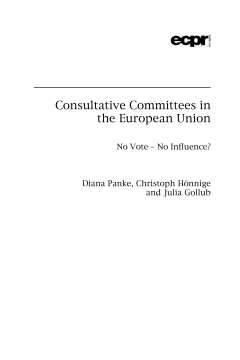
Additional Information
Book Details
Abstract
A quantitative analysis and three in-depth case studies on the European citizens’ initiative, the European grouping of territorial cooperation and the Liberalisation of Community Postal Services show how capacities, incentives and preferences of consultative committees and legislative decision-makers need to be configured to allow for the influence of the CoR and the EESC.
'Do actors without vote have influence in the European Union? Diana Panke, Christoph Hönnige, and Julia Gollub’s book is the definitive study of the Committee of Regions and the European Economic and Social Committee, the European Union’s two standing consultative bodies. They must be heard, though not necessarily listened to, on most EU legislation. The study shows convincingly that CoR and EECS influence is possible, though conditional on whether they can bring expertise to the table. Guided by an elegant sender-receiver model, the authors develop a series of hypotheses that specify these conditions, and test these with surveys, interviews, and case studies. This is a first-rate scholarly book, rich with factual nuggets and clear analysis. It will be of interest to EU policy makers as well as students of the European Union. This book also sends a cautiously hopeful message to those who seek to deepen democracy in the globe’s most important experiment in governance above the state.'
Liesbet Hooghe, University of North Carolina at Chapel Hill
'Consultative committees are too often dismissed as being mere talking shops when in fact they can play an important role in the agenda-setting and decision-making process. This volume presents in-depth research into the working methods and deliberative processes of the two main consultative committees in the European Union. In doing so, the authors provide valuable accounts of both the opportunities and the limitations of these bodies. Most importantly, this book explores the conditions under which consultative committees may make a difference to EU decision-making and proposes a number of specific recommendations based on this analysis. Required reading not only for students and scholars of European integration, but also for practitioners involved in the work of policy consultation in the EU and beyond.'
Thomas Christiansen, Maastricht University
'The primary focus of this welcome and important contribution to our understanding of EU consultative committees is the influence of two under-researched organisations with ‘voice, but no vote’: the European Economic and Social Committee, and the Committee of the Regions. Drawing on quantitative and qualitative data from a well-framed and well-executed research project, the authors show, among other things, how the provision of information is more important than legitimacy in conditioning these committees’ influence on policy. This book’s clearly articulated evidence, findings and implications make it recommended reading for anyone interested in the role that committees play in our political systems, and essential for students of EU governance.'
Michelle Cini, University of Bristol
Table of Contents
| Section Title | Page | Action | Price |
|---|---|---|---|
| Consultative Committees in the European Union | i | ||
| Contents | v | ||
| List of Figures and Tables | vii | ||
| Abbreviations and Acronyms | xi | ||
| Preface | xiii | ||
| Chapter One Introduction | 1 | ||
| Chapter Two Consultative Committees in the EU | 15 | ||
| Chapter Three Three Empirical Puzzles: The Influence of Consultative Committees | 27 | ||
| Chapter Four A Sender-Receiver Model: Exchanging Information and Legitimacy for Influence | 43 | ||
| Chapter Five Quantitative Analysis | 63 | ||
| Chapter Six Three Case Studies | 89 | ||
| Chapter Seven Conclusions | 161 | ||
| Appendices | 179 | ||
| Bibliography | 211 | ||
| Index | 227 |
